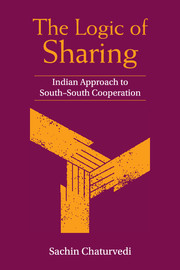Book contents
3 - Institutional Framework
from Section I - Policy and Institutional Framework
Published online by Cambridge University Press: 05 March 2016
Summary
Since India's Independence, almost all government ministries have operated in line with requests from partner countries. It is not only the MEA that initiates and manages development cooperation-related programmes. Line ministries, particularly those of Agriculture, Science and Technology, Health and Family Welfare, Environment and Forest, Human Resource Development and related agencies also play an important part (see Figure 3.1).
Chapter 2 included a discussion of the role of Exim Bank, an instrument of the MoF, in the new arrangements for managing credit lines. Line ministries become involved when a related demand is raised by partner countries. Socio-economic indicators show that most partner countries are at a stage where innumerable sectoral challenges dominate their policy concerns, a situation duly reflected in the nature of the demands that India faces. The line ministries’ response, however, varies depending on how they balance domestic pressures against external demands. For some, domestic demand is such that their thrust is largely towards developed countries. The Department of Biotechnology (DBT), for example, had major programmes with the South since its establishment, but this demand began to taper off from 2006 in response to a growing thrust toward linkages with developed countries. The DBT Annual Report for 2012–13, as in previous years, has nothing to report on India's engagement with developing countries. It is clear that even if MEA pushes for closer ties with a specific set of countries its intentions would remain in the realm of rhetoric if line ministries do not respond with the requisite commitment. At times, individual preferences and priorities seem to prevail for the selection of particular countries and programmes. It goes without saying that in some instances, the traction for cooperation with Northern partners and visits to those countries is extremely strong.
Reaction from line ministries also depends on the nature of any international links they may have. In that respect the policies of international institutions have important implications for the nature of the programmes line ministries develop; for instance the World Health Organization (WHO) might facilitate programmes from the Ministry of Health (MoH) to other developing countries. Similarly, FAO or International Fund for Agricultural Development (IFAD) would influence the involvement of the Ministry of Agriculture (MoA). Such influence may be direct, or through personal exposure and other indirect contacts such as seminars, workshops, or fellowship programmes.
- Type
- Chapter
- Information
- The Logic of SharingIndian Approach to South–South Cooperation, pp. 75 - 96Publisher: Cambridge University PressPrint publication year: 2015



